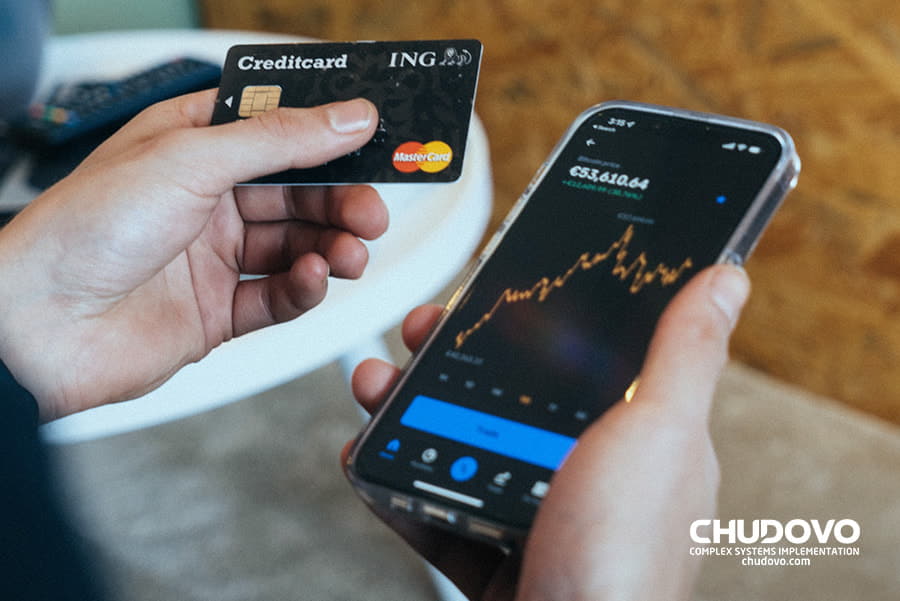Revolutionizing the Financial Industry: The Power and Potential of Blockchain for Banking
Blockchain technology has emerged as a powerful tool that has the potential to revolutionize the banking industry. In this article, we explore how blockchain technology in banking is being used and how it will pave the way for the industry’s future. Blockchain technology, with its potential for revolutionizing banking, offers unique features and benefits that can enhance their operations. Many banks and finance businesses can greatly benefit from adopting blockchain technology, as it offers an array of features that can address various challenges traditional banking systems face. Let’s read on!
Table of contents
- What is Blockchain?
- A Brief History of Blockchain for Banking and Finance
- What is Blockchain Technology in Banking?
- Feature of Blockchain for Banking
- What are the Benefits of Blockchain?
- Application of Blockchain in Banking
- Challenges of Blockchain in Banking
- Who is Using Blockchain Technology?
- The Future of Blockchain in Banking
- Conclusion
- FAQs

What is Blockchain?
The blockchain is a decentralized information system. It is a kind of virtual account book where all transactions and operations are recorded (any exchange of money, an electronic register of votes, company billing, etc.). In short, millions of computers distributed worldwide weave a wide network of giant information.
In this way, the security and integrity of all the information are guaranteed since all the data that make up the system (classified into blocks) have to validate the new information that is incorporated into it. Additionally, decentralization eliminates the need for intermediaries, generating greater independence and reducing network costs.
Its best-known application is the one that has to do with cryptocurrencies. cryptocurrency is a digital medium of exchange that uses cryptography to secure transactions. In fact, everyone associates the blockchain with Bitcoin, although other cryptocurrencies are becoming increasingly popular, such as Ethereum or Ripple.
But the blockchain is not limited only to its application on cryptocurrencies. It covers areas as heterogeneous as health, law, or logistics. And, of course, also the financial sector, where it is one of the technologies with the most promising future.
A Brief History of Blockchain for Banking and Finance
The history of Blockchain dates back to 2008 when Satoshi Nakamoto introduced Bitcoin, the first decentralized cryptocurrency. Blockchain technology made Bitcoin transactions transparent and immutable. Since then, the applications of Blockchain have expanded beyond just cryptocurrencies.
Before the Blockchain technology era, the digital revolution completely transformed traditional media formats. The spread of the Internet has made it possible for people to obtain the latest information anytime, anywhere. Similarly, it also impacted the financial industry. Financial services shifted to databases in the 1970s and 1980s, web pages in the 1990s, and mobile apps in the 2000s.
However, it is difficult to say that the digital revolution has occurred in international transactions. Large banks still use complex mechanisms for simple transactions like international remittances.
Blockchain technology has been making waves in the financial industry, and its potential for revolutionizing banking is hard to ignore. Blockchain can greatly benefit banks and finance businesses with unique features and benefits.

What is Blockchain Technology in Banking?
Blockchain technology, with its potential to revolutionize the financial industry, is significantly impacting banking. Small or big banks and finance businesses are recognizing the power and potential of Blockchain in enhancing their operations.
One of the key assurances of blockchain technology in banking is its ability to provide security and transparency. The decentralized nature of Blockchain eliminates the need for intermediaries, reducing costs associated with traditional transaction processes. This enhanced security gives customers confidence that their data is safe from any unauthorized access or tampering.
Further, Blockchain for banking lies in its ability to streamline processes through automation. Banks can automate routine tasks such as loan approvals or Know Your Customer (KYC) procedures by utilizing smart contracts- digital agreements stored on a blockchain network. This not only saves time but also reduces human error, leading to improved efficiency within these institutions.
Additionally, adopting blockchain technology enables small banks and finance businesses to enhance their supply chain management capabilities by enabling real-time tracking of transactions from origin to destination. With this level of visibility, parties involved can have greater control over inventory management and ensure smooth transactions throughout the entire supply chain process.
Furthermore, using Blockchain for payment processing offers considerable benefits such as faster settlement times at lower costs compared to traditional methods like wire transfers or checks. Blockchain-based payments eliminate lengthy clearance periods by providing instant verification through secure peer-to-peer networks.
Moreover, faster transaction times using blockchain technology leads to improve customer satisfaction significantly. Therefore, the banking sector is leveraging this decentralized platform to offer customers streamlined processes where they no longer have to wait days for funds transfers or endure cumbersome paperwork when applying for loans.

Feature of Blockchain for Banking
Blockchain technology has emerged as a game-changer in the banking industry, offering small banks and finance businesses the opportunity to revolutionize their operations. The power and potential of Blockchain for banking cannot be understated – it has the ability to transform how financial transactions are conducted, improve security measures, streamline processes, and ultimately enhance customer satisfaction.
One of the key features of blockchain technology in banking is its ability to provide a decentralized system for storing and verifying transactions. Traditional banking systems rely on centralized databases that are vulnerable to cyber attacks or human error. In contrast, Blockchain offers a distributed ledger where it keeps every transaction is records across multiple nodes within the network. This decentralization makes it nearly impossible for hackers to tamper with data or manipulate records.
Moreover, adopting blockchain technology can bring significant cost savings for banks and finance businesses by eliminating middlemen such as clearing houses or intermediaries involved in payment processing. Blockchain allows direct peer-to-peer transactions without requiring third-party involvement while ensuring transparency throughout the entire process.
In addition to cost reduction, Blockchain can significantly reduce transaction time by removing manual processes associated with paperwork verification and reconciliation. Blockchain’s automated smart contracts allow for quick and secure payments based on predefined rules encoded in digital contracts.
The feature of Blockchain extends beyond transactional efficiency; this technology also enhances security measures in an era where cyber threats continue to evolve rapidly. Leveraging cryptography techniques like encryption algorithms within each block of data stored on a chain-like structure (hence “blockchain”) makes sensitive information virtually impenetrable even if one block were compromised.
Furthermore, utilizing dedicated development teams equipped with specialized knowledge about implementing custom software development solutions explicitly tailored towards adopting this revolutionary technology ensures seamless integration into existing bank infrastructures.
What are the Benefits of Blockchain?
Blockchain technology has the potential to revolutionize the banking and financial sectors, which cannot be ignored. These institutions can greatly benefit from adopting blockchain systems, which offer an array of features that address various challenges traditional banking systems face.
One of the key pros of using blockchain for banking is enhanced security. The decentralized nature of Blockchain ensures that data is stored across multiple nodes, making it almost impossible for hackers to manipulate or access sensitive information. This level of security gives customers peace of mind knowing that their personal and financial data is protected.
In addition to improved security, Blockchain also provides transparency and accountability. Every transaction on the Blockchain creates an immutable record that can be audited anytime. This feature not only helps prevent fraud but also streamlines compliance processes by providing regulators with real-time visibility into transactions.
Another advantage Blockchain offers in the banking sector is faster processing times for payments and transactions. Traditional payment methods often involve intermediaries such as clearing houses or correspondent banks, resulting in delays and higher costs. With blockchain-based systems, transactions are carried out directly between parties involved without the need for mediators, leading to faster settlement times at lower costs.
Blockchain also enables more efficient supply chain management within the finance industry. By utilizing smart contracts on a shared ledger system, banks can streamline processes such as loan approvals or trade financing by automating contractual terms execution based on predefined conditions agreed upon between parties involved.
Furthermore, reducing cost falls hand-in-hand with increasing efficiency when employing this innovative technology. Fewer manual interventions are required compared to traditional methods, resulting in less paperwork, time-consuming audits, and overall resource savings. This ultimately translates into reduced operational expenses, a crucial factor, especially for small banks trying to remain competitive while keeping overheads low. In short,
- blockchain holds tremendous promise for enhancing security
- speeding up transaction processing times
- reducing costs
- improving customer transparency
- enabling smaller banks to effectively serve customers

Application of Blockchain in Banking
In recent years, several investments in platforms and developments that offer solutions in this technology have been announced and as a consequence, banking is changing completely.
What are the real applications of blockchain technology in the financial sector?
Today, the most important use cases of the Blockchain that you can find in the financial field are these:
- Trading of crypto assets
Although it is still an activity that is done very timidly and awaiting its regulation in the European market, it may already be how some banks begin to offer the possibility of buying Bitcoin. BBVA is an example of a bank that offers this activity in Switzerland through its New Gen account.
- Denial of assets
The immutability of the data collected by customers and stored in the Blockchain gives technology a very high and special value in negotiating and issuing digital assets. Any type of operation is monitored throughout the process.
- Tokenization
Do you know this term? “Tokenization is the representation of a real asset into a digital asset on the blockchain.” The truth is that the financial sector and banks have been working for years on the tokenization of assets and digital cash.
- DeFi
One of the buzzwords in the world of cryptocurrency. They are loans that banks have marketed for many years, but since cryptocurrencies have arrived.
- Insurance
Smart contracts make it possible to regulate claims settlement transparently. Since all claims settlements are processed through a network, false claims can be filtered out faster and more agile.
The financial sector has already begun to apply all the advantages that blockchain technology offers, and at Chudovo, we believe this is just the tip of the iceberg.
The next few years will be key to confirming all the establishment of the chain of blocks between banks and thus consolidating this technology in the financial market.
Challenges of Blockchain in Banking
Blockchain technology has emerged as a powerful tool with immense potential to revolutionize the banking industry. Small banks and finance businesses are beginning to recognize the benefits of Blockchain for banking, embracing this innovative approach to enhance their systems, processes, and overall efficiency. However, like any new technological advancement, there are several challenges that need to be addressed for seamless integration.
One of the foremost challenges banks and finance businesses face is adopting blockchain technology into their existing infrastructure. The complex nature of Blockchain requires specialized knowledge and expertise. Therefore, these institutions need to have a dedicated development team that understands blockchain technology and banking operations’ intricacies.
Another challenge lies in data security when using Blockchain for banking purposes. While distributed ledger technology ensures transparency by recording all transactions on multiple nodes across a network, it also poses privacy concerns regarding sensitive customer information. Striking a balance between transparency and data protection becomes critical in maintaining trust within the industry.
Furthermore, integrating different systems within supply chains can be cumbersome due to varying degrees of adoption across stakeholders such as suppliers, manufacturers, distributors etc., making it challenging for small banks or financial institutions aiming at utilizing this revolutionary system effectively.
As demand grows rapidly amidst evolving technologies-driven demands on how products should look or perform (such as Internet-of-Things devices), scalability becomes another hurdle that needs careful consideration while implementing blockchains into legacy infrastructures.
Additionally, the processing time required by traditional payment methods may pose an obstacle in today’s fast-paced environment, where customers expect immediate transaction settlements. Users require faster ways that reduce overhead costs hence increasing efficiency over time.
Lastly, the high costs associated with implementing large-scale blockchain solutions can deter smaller banks from fully embracing this transformative technology. Costs associated with hiring skilled developers or software development agencies who understand bank-specific requirements seem more expensive.

Who is Using Blockchain Technology?
The World Economic Forum estimates that the blockchain will store 10% of global GDP by 2025 . However, the expectation is that this figure will increase, with banks, insurance companies and companies in the technology sector leading the trend.
According to PwC’s 2018 Global Blockchain Survey research, approximately 84% of executives surveyed are looking to gauge the impact this technology could have on their business [2]. In parallel, global companies such as Amazon, Microsoft, IBM and Facebook are evaluating possible applications for the blockchain, as are other financial institutions, such as JP Morgan and HSBC, and other leading consulting and auditing multinationals, such as Accenture and Deloitte (respectively).
The interest that blockchain technology has generated can be seen in various sectors of the economy, from finance to health and pharmaceuticals. However, banks are leading the advances in developing and implementing this technology.
Further, Mastercardis one of 22 financial companies that made the Forbes Blockchain 50 2023 list of billion-dollar companies putting distributed ledger technology to actual use. Mastercard is also a prototypical corporate intermediary. It made $22 billion in revenue and $10 billion in profit last year from fees it charges financial institutions to essentially help customers spend their own money. In other words, Mastercard is exactly the type of company that cryptocurrency fans love to hate.
But millions of merchants around the world trust it. And in the wake of the never-ending barrage of Web3 scandals, scams, and scams, trust is exactly what the industry needs. Smelling opportunity, blue-chip financial giants, including BlackRock, JPMorgan and Fidelity, have become some of the biggest champions of new technology.
The Future of Blockchain in Banking
The future of Blockchain in banking holds immense promise for banks and finance institutions. This revolutionary technology has the potential to transform the financial industry, offering a secure and transparent solution for various banking processes.
One of the most promising applications of blockchain in banking is in the area of cross-border payments. Currently, cross-border payments can be slow, expensive, and prone to fraud. Blockchain technology could streamline the cross-border payments process, making it faster, cheaper, and more secure.
Another potential application of blockchain in the banking industry lies in trade finance. Trade finance involves financing international trade transactions. By utilizing blockchain technology, the trade finance process can be streamlined, resulting in enhanced efficiency and security.
Moreover, blockchain technology has the capability to enhance the security of banking systems. Being a tamper-proof ledger, blockchain significantly reduces the risk of hacking. Consequently, this could bolster the overall security of banking systems, safeguarding them against cyberattacks.
Furthermore, blockchain has the potential to enhance the transparency of banking operations. As a public ledger, all transactions are visible to every participant in the network. This has the potential to provide customers and regulators with greater transparency regarding banking operations.
Certainly, there are still certain obstacles that must be overcome prior to the complete implementation of blockchain in the banking sector. These hurdles encompass interoperability, scalability, and regulation. Nevertheless, developers and regulators are actively working towards resolving these challenges.
In short, by leveraging blockchain technology, banking institutions may have a core focus on simplifying the process of:
- lending money,
- reduce costs and time on international money transfers,
- increase accountability, and
- make stock trading more efficient.
On the whole, the future of blockchain in the banking industry appears highly promising. This technology has the potential to fundamentally transform the operational processes of banks, enhancing their efficiency, security, and transparency. As these challenges are effectively addressed, we can anticipate witnessing a more widespread adoption of blockchain technology in the banking sector in the years to come.

Certified engineers
Convenient rates
Fast start
Profitable conditions
Agreement with
EU company
English and German
speaking engineers
Conclusion
In conclusion, the power and potential of blockchain technology for banks and finance businesses cannot be overstated. This revolutionary technology has the ability to transform the way these institutions operate, offering numerous benefits that can enhance efficiency, security, and customer experience.
Financial institutions must recognize that embracing this cutting-edge technology requires collaboration with dedicated development teams specializing in Blockchain Development within Software Development firms. It is because building robust systems tailored specifically towards your needs demand expertise from professionals well-versed in intricacies related to banking infrastructure.
FAQs
What is the blockchain financial system?
For the Institute of International Finance, the blockchain is a distributed, decentralized, public and encrypted ledger in which people can store information and make secure transactions without the need for intermediaries.
What benefits does the use of blockchain generate in banking?
One of the advantages of this tool is providing the possibility of making economic transactions quickly and safely against possible fraud and manipulation since it uses encryption and coding.
What financial institutions are using blockchain technology?
Financial institutions like JP Morgan, Goldman Sachs and Mastercard are focusing their efforts on applying more robust Blockchain technology in their products and services.
How is blockchain used in finance and banking?
Blockchain has the potential to optimize banking and lending services by mitigating counterparty risk and expediting the issuance and settlement processes. It facilitates the utilization of authenticated documentation and KYC/AML data, thereby diminishing operational risks and enabling instantaneous verification of financial documents.
How does the blockchain affect banks?
Blockchain technology could revolutionize the global banking system. The network is particularly important in facilitating cross-border payments: it transmits messages between banks in different countries, telling them credit or debit accounts.
Are You Looking for a Development Team for Your Blockchain Project?
Blockchain technology is a potent tool that has the potential to transform your financial institutions. Before implementing blockchain technology, banks must consider their options carefully before deciding to use it.
With the help of the right software development team, banks and financial institutions can integrate blockchain technology into their operations to realize its full potential.
Are you looking for a dedicated development team for your blockchain project? Contact Chudovo Today!




